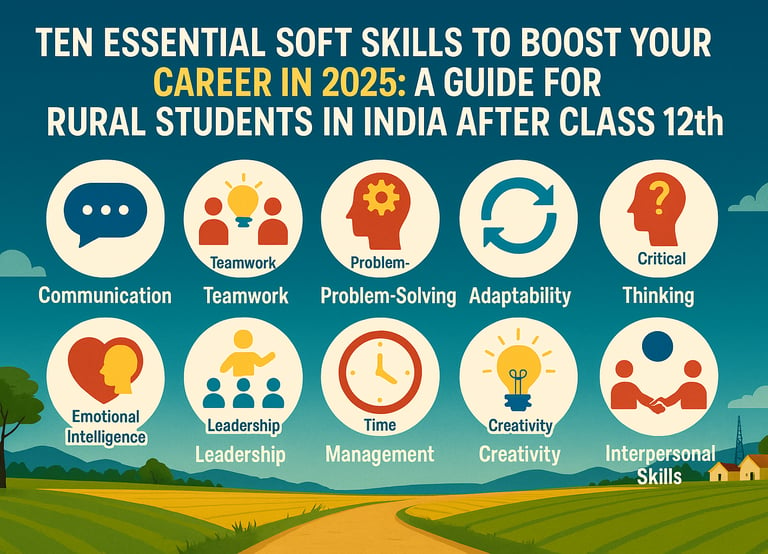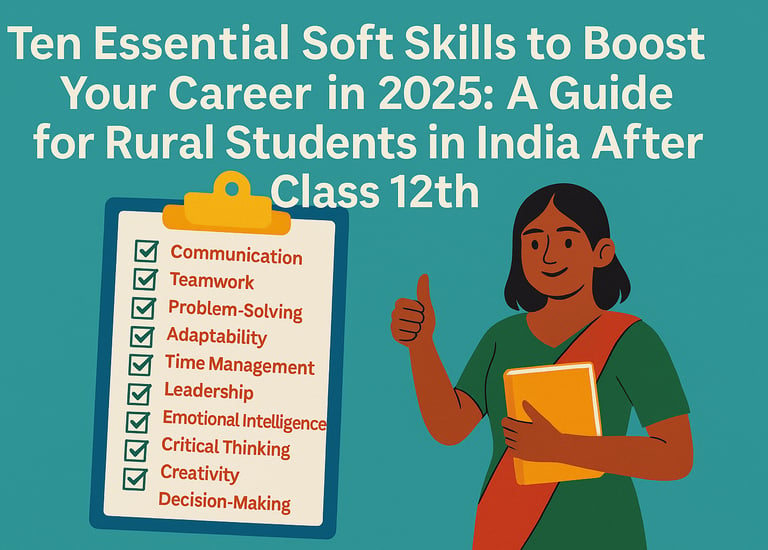Essential Soft Skills for Rural Students in India
AI & SKILLS
Chaifry
6/2/20256 min read
Ten Essential Soft Skills to Boost Your Career in 2025: A Guide for Rural Students in India After Class 12th
The job market in India is undergoing significant changes, influenced by technological advancements, globalization, and an increased emphasis on interpersonal skills. Students from rural areas, particularly those who have recently completed their Class 12th, encounter both challenges and opportunities in this evolving landscape. Limited access to quality education, technology, and professional networks can make the transition to higher education or the workforce particularly challenging for these students. However, soft skills—personal attributes that facilitate effective communication, collaboration, and problem-solving—are emerging as critical factors for success. These skills are highly valued by employers and can be developed by anyone willing to invest the effort, regardless of their background. This guide identifies ten essential soft skills that rural students in India should focus on to enhance their career prospects in 2025. Each skill is specifically tailored to address the unique challenges faced by rural students, offering practical development tips and real-world examples to inspire action. Whether aiming for employment in urban areas or pursuing further education, these skills can empower students to succeed in a competitive environment.
1. Communication
Why It’s Important
Effective communication is the cornerstone of professional success. It involves speaking and writing clearly, listening actively, and understanding non-verbal cues. In India’s diverse linguistic landscape, proficiency in English—the language of business—can open doors to opportunities. For rural students, mastering communication is crucial for excelling in interviews, collaborating with colleagues, and building professional relationships.
Challenges for Rural Students
Many rural students face language barriers, particularly with English, due to limited exposure in schools or communities. This can lead to a lack of confidence in formal settings, such as job interviews or presentations, putting them at a disadvantage compared to urban peers.
How to Develop It
Practice English Regularly: Use free online platforms like Duolingo or YouTube channels dedicated to English learning to improve speaking and writing skills. Dedicate 30 minutes daily to practicing conversations or writing short essays.
Engage in Group Discussions: Join school debates, community meetings, or local youth groups to practice articulating thoughts in front of others.
Seek Feedback: Record yourself speaking and ask teachers, peers, or mentors for constructive criticism to refine your style.
Read Widely: Read English newspapers, books, or online articles to enhance vocabulary and comprehension.
2. Teamwork/Collaboration
Why It’s Important
Most modern workplaces rely on teamwork to drive innovation and productivity. The ability to work well with others, share ideas, and contribute to common goals is highly valued. With remote work becoming standard in 2025, virtual collaboration skills are also essential. For rural students, teamwork skills can help them integrate into diverse urban or corporate environments.
Challenges for Rural Students
Limited exposure to team-based activities in rural schools or communities can make collaboration unfamiliar. Additionally, cultural differences and limited access to technology can pose challenges when working with diverse teams or using virtual tools.
How to Develop It
Join Group Projects: Participate in school projects, sports teams, or community initiatives to practice working collaboratively.
Learn Virtual Tools: Familiarize yourself with platforms like Google Docs or Zoom through free online tutorials available on YouTube.
Build Cultural Awareness: Learn about different cultures and traditions to better understand and work with diverse teams, even within India.
3. Problem-Solving/Critical Thinking
Why It’s Important
The ability to analyze problems, think critically, and devise solutions is crucial across industries. In 2025, with complex challenges driven by technology and globalization, employers seek individuals who can innovate and address issues effectively. Rural students, often accustomed to overcoming resource constraints, can leverage this skill to stand out.
Challenges for Rural Students
Limited access to structured problem-solving training or exposure to complex scenarios can hinder the development of critical thinking in a professional context.
How to Develop It
Tackle Local Issues: Identify community problems, such as water scarcity or waste management, and brainstorm practical solutions.
Engage in Case Studies: Use online resources or school assignments to practice analyzing real-world scenarios.
Learn from Failure: Reflect on past challenges to understand what worked and what didn’t, building a systematic approach to problem-solving.
4. Adaptability/Flexibility
Why It’s Important
The job market in 2025 is dynamic, with rapid technological advancements and shifting work practices. Adaptability allows individuals to learn new skills, embrace change, and thrive in uncertain environments. For rural students transitioning to urban areas or new industries, this skill is essential for overcoming culture shock and adjusting to new work cultures.
Challenges for Rural Students
Limited exposure to new technologies or urban lifestyles can make adaptation challenging. Moving from a familiar rural setting to an unfamiliar urban environment can also be overwhelming.
How to Develop It
Embrace New Experiences: Try new activities, such as learning a digital tool or volunteering in a different community.
Stay Informed: Follow industry trends on platforms like X to stay updated on changes in your field.
Develop a Growth Mindset: View challenges as opportunities to learn, practice resilience by setting and achieving small goals.
5. Emotional Intelligence/Empathy
Why It’s Important
Emotional intelligence (EI) involves understanding and managing one’s emotions and empathizing with others. It’s crucial for building relationships, resolving conflicts, and creating a positive work environment. Rural students, often from close-knit communities, may have a natural inclination toward empathy but need to refine it for professional settings.
Challenges for Rural Students
Limited interaction with diverse groups can make it harder to navigate complex interpersonal dynamics in professional environments.
How to Develop It
Practice Active Listening: Focus on understanding others’ viewpoints without interrupting, practicing in community discussions or online forums.
Reflect on Emotions: Keep a journal to understand how your emotions affect your interactions.
Seek Diverse Interactions: Engage with people from different backgrounds through online communities or local events.
6. Leadership
Why It’s Important
Leadership skills empower individuals to take initiative, inspire others, and drive change. In 2025, with flatter organizational structures, leadership is expected at all levels. For rural students, leadership can mean advocating for their communities or excelling in professional roles.
Challenges for Rural Students
Fewer opportunities for leadership roles in rural settings can limit experience. Traditional hierarchies may also discourage taking initiative.
How to Develop It
Take Initiative: Volunteer to lead school projects, community events, or youth groups.
Mentor Others: Guide younger students or peers to build confidence in leadership.
Learn from Role Models: Read biographies or watch videos of successful leaders on platforms like YouTube.
7. Time Management/Organization
Why It’s Important
Balancing multiple responsibilities is a common challenge for rural students, who often juggle studies, family duties, and community obligations. Effective time management enhances productivity, reduces stress, and ensures deadlines are met, a critical skill in fast-paced workplaces.
Challenges for Rural Students
Competing priorities and limited access to organizational tools can make time management difficult.
How to Develop It
Use Simple Tools: Use a basic diary or free apps like Google Calendar to plan your day.
Prioritize Tasks: Identify high-priority tasks and tackle them first to stay organized.
Set Goals: Break large tasks into smaller, manageable steps to maintain focus.
8. Creativity/Innovation
Why It’s Important
Creativity drives innovation, solving complex problems and creating new opportunities. In rural areas, where resources are limited, creative thinking can lead to sustainable solutions. In 2025, with innovation emphasized across industries, creative individuals have a competitive edge.
Challenges for Rural Students
Limited exposure to diverse ideas and resources can restrict creative thinking, though necessity often fosters creativity in resource-constrained environments.
How to Develop It
Brainstorm Solutions: Regularly think of new ways to address local issues, such as improving agricultural practices.
Engage in Creative Hobbies: Practice painting, writing, or music to stimulate imagination.
Seek Inspiration: Follow innovative ideas on platforms like X or read about advancements in your field.
9. Analytical Thinking
Why It’s Important
With data becoming central to decision-making, analytical thinking—evaluating information critically to make informed decisions—is increasingly valuable. This skill is useful in fields like business, technology, and research, helping rural students make better choices in education and career paths.
Challenges for Rural Students
Limited access to data analysis tools and training can make this skill harder to develop, but basic analytical skills can be cultivated through practice.
How to Develop It
Practice with Data: Analyze publicly available data, like government statistics, to identify trends.
Critical Reading: Read news articles and evaluate arguments to sharpen critical thinking.
Play Strategy Games: Engage in games like chess or Sudoku to enhance logical thinking.
10. Cultural Intelligence
Why It’s Important
Cultural intelligence (CQ)—the ability to work effectively with people from diverse backgrounds—is essential in a globalized world. For rural students, who may have limited exposure to diverse cultures, CQ can open doors to urban or international opportunities.
Challenges for Rural Students
Limited interaction with diverse groups can make understanding cultural nuances challenging, but India’s rich cultural diversity offers opportunities to learn.
How to Develop It
Learn About Cultures: Read books, watch documentaries, or follow social media accounts showcasing different cultures.
Travel Locally: Visit different parts of India to experience regional cultures, if possible.
Online Interactions: Join international online communities on platforms like X to interact with diverse individuals.
Conclusion
For rural students in India who have just completed Class 12th, mastering these ten soft skills—communication, teamwork, problem-solving, adaptability, emotional intelligence, leadership, time management, creativity, analytical thinking, and cultural intelligence—can transform their career prospects in 2025. These skills address the unique challenges of limited resources, language barriers, and exposure to diverse work environments, enabling students to compete in a dynamic job market. By leveraging accessible resources like online learning, community involvement, and mentorship, rural students can build a strong foundation for success, becoming not just employees but leaders and innovators in their fields.




